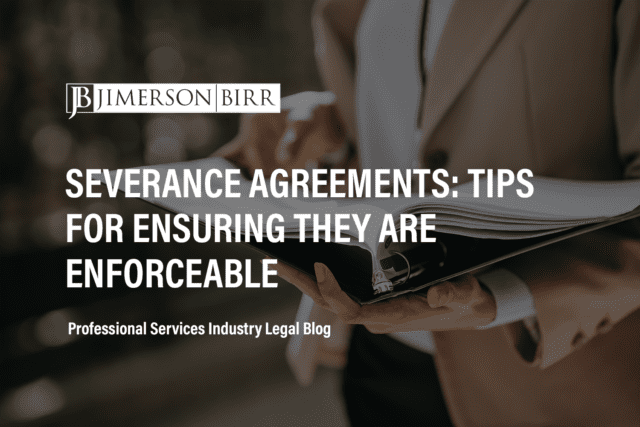What are severance agreements?
Severance agreements are formal legal documents that outline the terms and conditions under which an employee separates from their employer. These agreements encompass various aspects, primarily detailing the compensation and additional benefits the departing employee will receive post-employment, contingent upon agreeing to specific conditions, such as refraining from legal action against the employer. Sometimes, a severance agreement may act as an incentive for employees to voluntarily resign from their positions.
In Florida, as in most states, no laws mandate employers to offer severance pay to terminated employees. However, some employers opt to provide severance packages in particular situations.
For instance, during company downsizing or restructuring, employers might extend severance offers to employees.
Seeking guidance related to severance agreements? Schedule a consultation today with a seasoned employment law attorney.
In Florida, which laws and regulations relate to severance agreements?
In Florida, no specific laws or regulations exist governing severance agreements. Nevertheless, employers must adhere to relevant state statutes, such as the Florida Civil Rights Act, which prohibits workplace discrimination based on factors like race, color, religion, sex, pregnancy, national origin, age, disability, or marital status.
Additionally, severance agreements need to comply with federal laws, which often correspond with state-level mandates. For instance, the Age Discrimination in Employment Act (ADEA) mandates employers to furnish specific information to employees when presenting them with a severance agreement and, further, entitles individuals over 40 years old to severance pay under certain circumstances.
What are common issues regarding severance agreements that lead to litigation?
Litigation related to severance agreements in employment law often arises due to the following reasons:
- Ambiguity in Language: Poorly drafted severance agreements, especially those with ambiguous terms, can culminate in legal disputes. For instance, unclear specifications regarding the timing of severance payments could lead to disagreements.
- Waiver of Rights: Employers may offer severance agreements in exchange for an employee’s waiver of specific rights, but some rights cannot be waived. Courts have nullified agreements attempting to waive such rights.
- Discrimination Claims: Employees challenging discriminatory termination might contest severance agreements that waive their right to file discrimination claims. Federal and state laws prohibit employment discrimination based on various protected characteristics.
- Improper Influence: Instances where employers pressure or coerce employees into signing agreements may render those agreements void if proven.
- Confidentiality: Certain agreements contain confidentiality provisions limiting an employee’s ability to disclose employment-related information. However, provisions violating public policy or whistleblower protections may be unenforceable.
- Breach of Contract: Disputes may emerge from breaches like failure to make agreed-upon payments or violations of non-disparagement clauses.
To determine whether a unique situation may necessitate litigation, please contact our office to set up your initial consultation.
What steps should an employer take to minimize the risk of litigation over severance agreements?
To mitigate the risk of litigation associated with severance agreements, employers should consider the following measures:
- Review Applicable Laws: Before drafting agreements, employers must ensure compliance with federal and state laws, particularly in refraining from waiving employees’ rights protected by these laws.
- Clarity in Language: Employers should use language in agreements that are unambiguous, reducing the probability of disputes over interpretation.
- Consider Negotiation: Engaging in negotiation with employees regarding agreement terms can enhance satisfaction and decrease the likelihood of litigation.
- Provide Consideration: For an agreement to be legally binding, employees must receive some form of benefit or consideration in return for waiving certain rights. Employers should ensure the consideration offered is substantial.
- Maintain Professionalism: Employers should conduct negotiations and drafting with professionalism, avoiding actions that could be construed as pressuring or intimidating employees into signing, which might harm the employer’s reputation.
What evidence does a plaintiff generally need to successfully file a lawsuit regarding severance agreements, and what are common legal defenses to those claims?
Plaintiffs typically need to establish the following:
- Existence of a Severance Agreement: Proving the existence of a valid and enforceable severance agreement, often through signed written contracts or other documentary evidence.
- Breach of the Severance Agreement: Demonstrating the defendant’s failure to fulfill obligations outlined in the agreement, such as non-payment or failure to provide promised benefits.
- Damages: Presenting evidence of financial losses incurred due to the defendant’s breach.
Common defenses against severance agreement claims in employment matters include:
- Release: If the plaintiff previously released claims against the defendant in exchange for the severance agreement, further claims may be barred.
- Waiver: If the plaintiff waived their right to sue, they might be prevented from pursuing a breach claim.
- Validity of the Agreement: Arguments asserting that the severance agreement lacks validity or enforceability, due to reasons like lack of consideration, duress, fraud, or mistake.
- Performance of the Agreement: Claiming compliance with the terms or challenging evidence of the alleged breach.
- Failure to Mitigate Damages: If the plaintiff did not attempt to minimize losses resulting from the breach, recovery of certain damages might be limited.
- Statute of Limitations: Claims could be barred if not filed within a specified timeframe.
- Unclean Hands: If the plaintiff engaged in unethical actions during the agreement’s formation or execution, it might affect their claim’s validity. For personalized guidance on available actions or defenses for your situation, reach out to our office to arrange an initial consultation.
To see what actions or defenses may be available for your unique situation, please contact our office to set up your initial consultation.
Frequently Asked Questions
1. What types of claims can be waived in a severance agreement?
Depending on the agreement’s terms, employees may be asked to waive their right to sue their employer for various claims, including discrimination, harassment, and wrongful termination. For example, concerning discrimination, for such a waiver to be valid, it must be knowingly and voluntarily made. The agreement should be clear, unambiguous, and specifically refer to the rights being waived, such as those under the Florida Civil Rights Act or the federal discrimination laws. The employee should also be advised, in writing, to consult an attorney before signing the waiver. Courts will evaluate whether the waiver was made with full understanding and without coercion.
2. What are relevant tax considerations for severance pay in Florida?
Severance pay in Florida is subject to federal income tax, as it is considered taxable income under the IRS guidelines. This includes any lump-sum payments or continued salary payments. While Florida does not have a state income tax, other deductions like Social Security and Medicare taxes apply. Employers typically withhold the appropriate taxes from the severance pay.
3. How does a change in employment status, such as from full-time to part-time, affect severance agreement rights?
In Florida, a significant change in employment status, such as moving from full-time to part-time, may impact the terms of a severance agreement. If the employment contract includes provisions for severance under certain conditions, these may be triggered by such a status change. However, this depends on the specific language of the agreement. An employee faced with this situation should review their contract and consult with a legal professional to understand their rights and options.
Have more questions about a severance agreement-related situation?
Crucially, this overview of severance agreements does not begin to cover all the laws implicated by this issue or the factors that may compel the application of such laws. Every case is unique, and the laws can produce different outcomes depending on the individual circumstances.
At Jimerson Birr, our attorneys guide clients to help make informed decisions while ensuring their rights are respected and protected. Our lawyers are highly trained and experienced in the nuances of the law, so they can accurately interpret statutes and case law and holistically prepare individuals or companies for their legal endeavors. Through this intense personal investment and advocacy, our lawyers will help resolve the issue’s complicated legal problems efficiently and effectively. Having a Jimerson Birr attorney on your side means securing a team of seasoned, multi-dimensional, cross-functional legal professionals. Whether it is a transaction, an operational issue, a regulatory challenge, or a contested legal predicament that may require court intervention, we remain a tireless advocate every step of the way. Being a value-added law firm means putting the client at the forefront of everything we do. We use our experience to help our clients navigate even the most complex problems and come out the other side triumphant.
Having a Jimerson Birr attorney on your side means securing a team of seasoned, multi-dimensional, cross-functional legal professionals. Whether it is a transaction, an operational issue, a regulatory challenge, or a contested legal predicament that may require court intervention, we remain a tireless advocate every step of the way. Being a value-added law firm means putting the client at the forefront of everything we do. We use our experience to help our clients navigate even the most complex problems and come out the other side triumphant.
If you want to understand your case, the merits of your claim or defense, potential monetary awards, or the amount of exposure you face, you should speak with a qualified Jimerson Birr lawyer.
Our experienced team of attorneys is here to help. Call Jimerson Birr at (904) 389-0050 or use the contact form to set up a consultation.
Here are some blogs written by JB attorneys that provide more information about severance agreements:

We live by our 7 Superior Service Commitments
- Conferring Client-Defined Value
- Efficient and Cost-Effective
- Accessibility
- Delivering an Experience While Delivering Results
- Meaningful and Enduring Partnership
- Exceptional Communication Based Upon Listening
- Accountability to Goals











